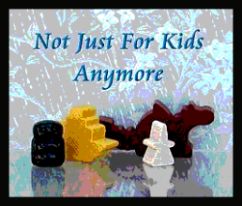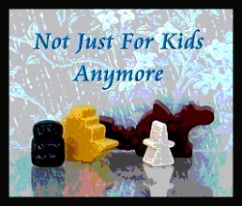Although there was much rolling of the dice, there weren't that many DRMs (die roll modifiers) to keep track of. I've recently come to the conclusion that I don't mind lots of dice rolling, it's keeping track of all the DRMs that is a major turn off for me. I much prefer wargames with only a few logical DRMs. Try as I might I get confused with more than 2 or 3 DRMs. As soon as I think I understand all the DRMs my leader dies, my troops mutiny, or my nation revolts and I have a new set of DRMs to contend with. A House Divided was pretty intuitive. I probably won't get to play again soon. It's tough to fit two player wargames into my schedule. Game nights are usually multi-player affairs.
Played one game of Twilight Struggle. Wasn't too impressed. Seemed like a basic area control game with too much chrome. Edit the rule book down to 8 pages and you could have the definitive Cold War game. Martin Wallace could take this basic design and create a killer game.
Played the Revised Axis and Allies the other day. Played with my regular game group. Had fun. No one was more surprised than I. Two of the players had never actually played A&A before. I expected the game to go a couple rounds, the down time would get to us and everyone would agree to throw in the towel. We could then play a good game before the night was wasted.
Didn't happen.
We did quit a little early, but it was clear that Germany and Japan would pull out a win by the next round and the Allies were powerless to stop them. I think the designers really added some good improvements to the new version. It is a much better game than the original Axis and Allies. Victory conditions were changed to require the capture of a certain number of cities. The Sahara, Himalayas, and neutral countries are impassable. Destroyers and artillery were added. Most importantly Germany and Russia have more points of contact, I think that did more to revitalize the game than any of the other tweaks. I'll be able to go several years without playing Axis and Allies again, but it is fun to pull out occasionally, especially now that it was revised for the better.
Speaking of waiting years between games, I played a five player game of Advanced Civilization at a game convention over the weekend. The game started at 11 a.m. Everyone understood that three of us would have to leave by 6:30 p.m. Yes, seven hours makes for a pretty short game of Civ, but the time just flew by. We made it right up to the Early Iron Age/Late Iron Age. I eked out a win.

The original and Advanced versions of Civilization continue to keep their rightful place at the top of the heap among long empire building games. If you have never played Civ nor Advanced Civ you need to find someone with a copy, set an entire day aside and learn the game. You will be hooked.
It's not a new game, but the more I play Napoleonic Wars the more I like it. DRMs be darned. Of course I still struggle with strategy that is second nature to experienced wargamers. The frequent rulebook checks still irritate me. I know. That's just part of wargaming. Then there is the standard wargame response, "I just checked ConSim and that rule was changed last week." Arrrrrrrgh.
Living rules, my butt. It's a game. Wargamers just accept this nonsense? Try telling the guy from the IRS that the deduction in question was allowed last year, if he responds with, "the rules were changed to keep things more balanced," you would want to kick his smarmy teeth in. Have you ever had to deal with the Environmental Protection Agency? Same thing. The EPA specializes in "living rules". Living rules are a form of legal harassment. Why do we want to introduce this concept into our hobby?
Rules are rules. Rules that change when someone whines are not rules. Make a rule and stick with it. Don't change the rule to reflect popular group-think.
When did wargamers buy into this notion that if it is posted on the web it is official? If a rule is important enough to change I want a phone call. At least an e-mail. Don't post it and expect everyone to go find it. If you don't care enough about the change to give me a call, don't make the change.
Living rules as applied to wargames represent nothing more than a bunch of repressed wanna-be bureaucrats who've appointed themselves as arbiters of fairness, because nothing in life should ever be unfair.
If there is a mistake fix it. If there is simply unbalance, tweak the rules in the next edition. [/rant]
I've played a few games of Elasund, and I have come to the conclusion that it is not a very good game. There is more hosage than your typical Settlers variation, which makes the game worth trying, but play a friend's copy. Do not buy Elasund hoping your wife will like it because she likes Settlers. There is no trading. There is no player interaction.
The four phases to each turn are not intuitive. After several games I still find I need to constantly refer to the step by step chart to make it through my turn. If I don't follow the chart I forget to do something major, like place a building permit, or take my two gold. I always forget if I need two or three influence cards to perform different actions, and if the cards need to be the same color or different colors.
Elasund is a very simple game, yet it feels like Advanced Squad Leader after a couple rounds. Instead of asking "What phase is next?", "Do you get to shoot at me in that phase, or the next one?", "When do I get to rally my guys again?", like I do in ASL, I'm asking "Do I take two gold before I move a building permit?", "Did I already place a building permit?", "How many influence cards do I need to do that, again?". Shortly after it starts I find my mind wandering and wishing for the game to end, but it just won't end.
I'm holding off on pronouncing Reef Encounter good or bad. (So far it is bad.) I am intrigued enough that I want to play a few more times. (That would be an indication that it is good.) And by the way, alga? Alga? A Google search indicates that alga is the Australian Local Government Association. Is alga common usage across the pond?
Theoretically I should like Reef Encounter. Maybe if the parrot fish looked more like a parrot fish instead of a box, and there was some algae in the game...







